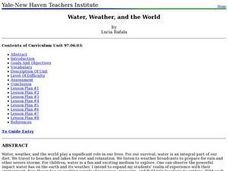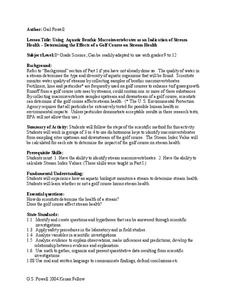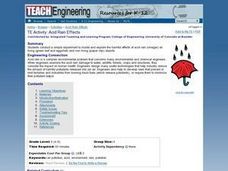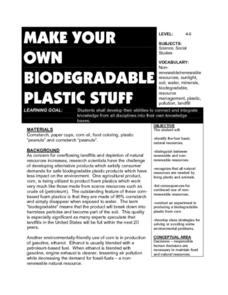Curated OER
Using Environmental Models to Determine the Effect of Acid Rain on an Ecosystem
Demonstrate to your middle school science learners how chalk breaks down in a weak acid. Discuss what affects acidic rain might have on ecosystems. Lab groups then choose one of two questions: "How does acid precipitation affect an...
Curated OER
Water Pollution Lesson Plan: Don't Trust Your Eyes
Students develop a list of actions they could perform that would protect our water resources from pollution. They formulate hypotheses, conduct experiments and draw conclusions about actual pollutants found in our water supply.
Curated OER
How to Clean Up an Oil Slick
Students explore how an oil spill is contained and cleaned up. They investigate an oil absorbing polymer that is hydrophobic, absorbs up to 19 times its own weight in nonpolar liquids, floats on water, and can be reused or disposed of by...
Curated OER
Erosion
Young scientists identify erosion, explain the causes of erosion, and name some techniques that can slow the process of erosion. Learners are divided up into groups of four and perform a simulation of soil erosion in class. The...
Curated OER
Contaminated Drinking Water
Students predict, experiment, and draw conclusions about the safety of drinking water. In this ecology lesson plan, students participate in an experiment to determine if they can taste or see contamination in drinking water. Data is...
Curated OER
Cleaning Water: How Filters Work
Learners construct their own water filter to obtain clean water. In this filtration lesson, students produce tainted water in order to properly filter it with filtration devices made in class.
Curated OER
Are You Thirsty? The Effects of Pollution on Drinking Water
Discuss the availability of clean, plentiful water and the causes of water pollution. In groups, sixth graders discuss problem-solving methods for keeping water clean. They explore the function of water treatment plants and perform...
Curated OER
Water Filtering
Students investigate how polluted water is filtered so people can use this recycled resource. They conduct an experiment in which they put "polluted" water through a filtering system. They investigate what happens at a water treatment...
Virginia Department of Education
Changes in Ecosystems
How does water pollution affect the environment? Provide your class with the resources to answer this question as they learn about eutrophication and ecosystem changes. Over two weeks, they simulate the effects of pollution on the...
Sargent Art
Protect Our Marine Life
Encourage water conservation and boost art skills with a hands-on activity that challenges young painters to create a scene highlighting marine life. Using oil pastels, scholars draw an underwater scene and write a tip for viewers to...
Curated OER
How Pollution Disrupts Our Natural Environment
Students conduct experiments to illustrate global warming. In this air pollution lesson, students first examine how a layer of greenhouse gasses might impact the earth's atmospheric temperature, then evaluate how the layer of gasses...
Curated OER
Water, Weather, and the World
Learners in a special education classroom examine the role of weather and water in their lives. Each day, they add a symbol for the weather outside and identify the proper activities for the weather on that day. In groups, they...
Curated OER
Water: Our Most Important Beverage
Third graders complete a KWL chart on what they already know about water and what they want to know. As a class, they participate in an activity in which they discover the amount of drinkable water on Earth and are introduced to the...
Curated OER
The Magic of Solar Thermal: How the Sun Can Be Used to Heat Water
Students are introduced to how the sun is used to heat water. In this solar lesson students identify the different types of solar water heating and demonstrate how it works.
Curated OER
Water filtration with Plants
Sixth graders explain how soil and plants effect contaminated water in nature. In this filtration lesson, 6th graders work in groups to test biofiltration units. Students determine which biofiltration units work best and how they can...
Kenan Fellows
Determining the Effects of a Golf Course on Stream Health
Do golf courses affect the water organisms in nearby streams and ponds? Small groups collect samples of water upstream and downstream from a golf course and analyze the macroinvertebrates found and the stream index values of the two...
Kenan Fellows
Microorganisms in Pond Water
That is living in the water? Groups of two to three view pond water with microscopes in order to find microorganisms. They draw pictures of the ones they find in their slides. The groups compare their drawings to pictures of common pond...
Curated OER
Acid Rain
Create a simulation of acid rain in your classroom with lemon juice and bean plants to help kids study the effects of pollution on plants. In addition, learners will listen to a story and write responses based on guiding questions.
Curated OER
The Air We Have Around Us
Students listen to story, The Lorax, by Dr. Seuss, discuss air quality and how people affect the earth and its atmospheric cycles, and give oral reports on what they have learned.
Curated OER
Acid Rain Effects
Get out the goggles and conduct a simple experiment to model and explore the harmful effects of acid rain (vinegar) on living (green leaf and eggshell) and non-living (paper clip) objects. Young chemists observe and describe the harmful...
Curated OER
Make Your Own Biodegradable Plastic Stuff
Students identify the four basic natural resources. They distinguish bettween renewable and non-renewable resources. Pupils recognize that all natural resources are needed by living plants and animals. Students list consequences for...
Curated OER
Chemical Consequences of Burning Fossil Fuels
Future scientists are introduced to the chemical consequences of burning fossil fuels, learning that fossil fuel combustion leads to the formation of oxides of three nonmetals: carbon, nitrogen, and sulfur, all of which end up in the...
University of Wisconsin
Follow the Drop
Young surveyors look for patterns in water flow around campus. Using a map of the school (that you will need to create), they mark the direction of the path of water. They also perform calculations for the volume that becomes runoff. The...
Curated OER
Missing Macroinvertebrates - Stream Side Science
Field study groups collect samples of stream water and identify the macroinvertebrates found. Using their data, they calculate a water quality index to rate the health of the stream. They graph their data and discuss the value of a water...

























